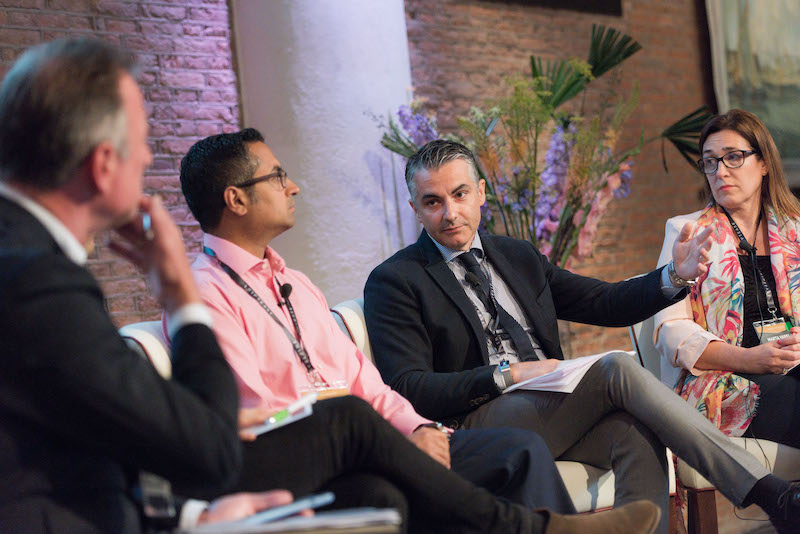Each month, the Hotel Heroes - our panel of trusted hospitality industry experts - answer questions from hotels around the world.
In August, hoteliers asked about the role of retargeting in a guest journey, budget allocation for 2020, wholesalers and more. Scroll down for the Heroes' answers!
Submit your question for the Hotel Heroes panel
What role does retargeting play in a booking funnel?

Answered by Hotel Hero Blessy Townes, Vice President & Head of Digital at Discovery Hospitality:
In a Google study, it was revealed that 96% of users leave a website without converting, 70% of visitors abandon shopping carts without purchasing, and 49% typically visit two to four websites before converting. With a retargeting campaign, you are able to bring these users back to your website and encourage them to complete their booking. Without it, OTAs and competitors will definitely steal them.

Answered by Hotel Hero Katherine J. Solomon, Corporate Director of Revenue Management at Arlo Hotels:
Prospecting is at the top of the booking funnel, with retargeting right below it. Retargeting guests who have already visited your website and landing page helps you to “follow up” and remarket to these warm leads. Not only does retargeting drive increased brand awareness, but it also helps with the end goal in improving conversion rates and direct bookings.
In terms of costs, it’s much cheaper to retarget to someone than to do prospecting. Retargeting can also be used for email segmentation to provide offers and content. Google, Facebook and Twitter all offer great retargeting tools.
Which team should manage wholesaler rates and contracts: sales or revenue?

Answered by Hotel Hero Inderpreet Banga, Vice President, Channel & Distribution Strategy at Wyndham Hotels & Resorts:
This is a great question and one that comes up time and time again. It is really a mutual partnership as your sales team is great at negotiation and revenue - overseeing the entire hotel.
That being said, if the sales team has certain sales goals or targets, it may not align with the rest of the revenue strategy. In addition, wholesale can sometimes undercut brand rates and sharing rates with partners that should have access to those rates.
From a hotel perspective, ensuring that the teams work together should come from the GM or owner of the hotel. It is in their best interest, and for the the profitability of the hotel, that the business is qualified and quantified with proper policies and Terms & Conditions (T&Cs) that benefit the property.
At Wyndham, the Distribution team leads the strategy overall along the lines of what is written in the agreements; T&Cs, policies, onward distribution clauses and termination. The sales team can utilize the agreement and any changes need to be discussed with the Distribution team and legal to ensure that the brand is covered and protected should any issues emerge from the partnership.

Answered by Hotel Hero Nicolas Durand, Senior Director of Global Distribution at Jumeirah Group / Jumeirah Hotels & Resorts:
It is indeed a team effort and it is essential to properly agree who is in charge of what. Establish a clear understanding of what model you want to work with - static or dynamic - based on your revenue management strategy.
Your distribution team should have an overview of global contracts with wholesalers and help move more of them from a static to a dynamic model in order to yield better. However, sales will always play a key role in animating the accounts, especially at a regional level.
I think each hotel needs to review their rate parity issue with their different accounts and, based on rate parity and analysis, they should take actions to get the right business depending on the overall commercial strategy. Bear in mind that each region or country has different dynamics.
At Jumeirah, sales and distribution complement each other. Here is what our model looks like:
Distribution:
- Contracting all accounts which are on dynamic rates, whether they are pure OTA, wholesalers or bedbanks;
- Setting global standards for dynamic rate management;
- Strategic account management for global OTA accounts;
- Managing the prioritization of connectivity for sales accounts to move to dynamic rates;
- Overall managing the rate parity project with our technology providers;
Sales:
- Contracting static contracts;
- Account management of static and dynamic wholesaler contracts;
- Any accounts historically managed by sales remain with sales;
- Accounts are split between our different global sales offices based on the territory;
- Each sales account manager will manage the discussion with the accounts that are leaking rates;
Let’s not forget that there are still a lot of wholesaler accounts which don't cause issues for hotels, so they can provide substantial revenue - especially for resort properties.

Answered by Hotel Hero Katherine J. Solomon, Corporate Director of Revenue Management at Arlo Hotels:
I'm biased of course, but I feel that the revenue team should manage wholesaler rates and contracts. This team has their fingers on the pulse of demand, pickup and forecast, and can immediately adjust rates, allotments and cut-offs in real-time. Once a wholesale contract is signed, this segment relies more on strategic pricing than personal relationships to drive the business. At that point, it's more beneficial to keep your sales team actively prospecting and fostering relationships with corporate consortia and group business.

Answered by Hotel Hero Ludovic Cacciapaglia, Assistant Vice President Distribution at Shangri-La Hotels and Resorts:
Ultimately, the question is how much revenue is your sales team really influencing. If the revenue mix and growth is predominantly coming from distribution channels, then the team structure should be aligned accordingly.
Sales should not be given goals based on wholesalers' growth - this is a channel, not an account. Hotels need to understand different source markets' buying behaviours. A good way to do so is to run a survey during check-in for those reservations coming from wholesalers and OTAs - simply ask the guest for their voucher to understand where and how they booked!
 Hotel Hero Ludovic Cacciapaglia, Assistant Vice President Distribution, Shangri-La Hotels and Resorts, at the Direct Booking Summit: Amsterdam 2018.
Hotel Hero Ludovic Cacciapaglia, Assistant Vice President Distribution, Shangri-La Hotels and Resorts, at the Direct Booking Summit: Amsterdam 2018.
What should hotels know when allocating their budget for 2020?

Answered by Hotel Hero Inderpreet Banga, Vice President, Channel & Distribution Strategy at Wyndham Hotels & Resorts:
From a marketing perspective, focus on trends and utilize market research. Triptease, Sojern and others share market information on industry spend as it pertains to digital marketing. Based on the evolution of Google Travel, OTAs are more focused on brand marketing than they ever have been in the past. Allocate more of your budget towards search and metasearch, but be smart about your allocations to drive high-value customers to your website, and when possible, utilize audience targeting strategies!

Answered by Hotel Hero Blessy Townes, Vice President & Head of Digital at Discovery Hospitality:
If your primary goal for 2020 is to grow your direct business, it’s time to switch your mindset: see OTA commissions as an expense and imagine the possibilities if you used those commissions to fund your own direct booking campaign.
If you’re in the advanced stages of your hotel's digital journey, look at your Google Ads Auction Insights for actionable ideas on the impressions share your budget could afford and where to scale up. It always pays to look at the customer journey and see which areas you’ve already covered and which can be added or improved on.

Answered by Hotel Hero Ludovic Cacciapaglia, Assistant Vice President Distribution at Shangri-La Hotels and Resorts:
I suggest to also consider source markets - it is important to keep investing in tactics to drive direct bookings on domestic markets whilst using OTA or third parties to capture long haul. For example, I would consider allocating some budget to OTA marketing such as Travel Ads Direct or Trip.com Pyramides (if your hotel is in Asia) to drive incremental visibility and acquire new guests.

Answered by Hotel Hero Katherine J. Solomon, Corporate Director of Revenue Management at Arlo Hotels:
Influencer marketing has grown to a $1.3 billion industry, so it's important to accommodate this major shift in traditional marketing methods and allocate accordingly.
Make sure to budget for complimentary room nights and amenities, and potentially look at bringing on a social media coordinator and/or an outside agency to manage the process effectively.
Now more than ever, hotels should also allocate additional budget to increase direct bookings. From spending more on metasearch and SEO planning, to paid social media and sweepstakes to grow your database, hotels have to get smarter to compete against OTAs.
What are the pros and cons of building a hotel app?

Answered by Hotel Hero Blessy Townes, Vice President & Head of Digital at Discovery Hospitality:
An app is a nice-to-have but approximately 80% of installed apps are either unused or eventually get uninstalled. Apps allow hotels to get a better share of screen and engagement; however, for brands with a limited number of properties, room inventories and repeat visit, an app can be an expense. It’s also not advisable if you have a minimal budget as it comes with a high cost of development and maintenance.

Answered by Hotel Hero Inderpreet Banga, Vice President, Channel & Distribution Strategy at Wyndham Hotels & Resorts:
For an individual hotel perspective, the pros and cons really depend on what engagement you are looking to drive with your guest or potential guests.
The biggest con is that you spend the money and don’t see the anticipated return or benefit you expected. From a booking perspective, you would be best suited to enhance your mobile web experience instead of investing in a mobile app. When it comes to bookings, mobile-ready websites still trump apps.
If the focus is guest engagement, tools that allow guests to communicate directly with the front desk, housekeeping, engineering, sales, spa, restaurant, room service and more could be greatly beneficial! In addition, you can work with local restaurants or attractions on a revenue share model to book through preferred links or with specific codes to drive additional ancillary revenue to the hotel.

Answered by Hotel Hero Katherine J. Solomon, Corporate Director of Revenue Management at Arlo Hotels:
Mobile apps are extremely beneficial in terms of gaining awareness and driving guest engagement. They're also an important factor in on-site guest experience; providing travelers with mobile key entry could put you ahead of hotels within your competitive set. That said, keyless entry has also been deemed a detriment to guest experience, particularly for guests who are looking for a personalized touch and human interaction. From a budgeting perspective, especially with independent hotels, mobile apps can prove expensive to manage due to the vast amount of resources and personnel needed to ensure its success.
What tech solutions should independent hotels with smaller budgets prioritize and where can they save money?

Answered by Hotel Hero Rob Paterson, CEO at Best Western GB:
Revenue Management Software and automation. Automate payments, check-in and check-out processes to get a greater return on investment (ROI) in 2020. Here's a handy tip: ensure that your Property Management System (PMS) wipes the ghost OTA emails and that your auto check-in enforces guest email collection.
When should a hotel change a tech partner?

Answered by Hotel Hero Katherine J. Solomon, Corporate Director of Revenue Management at Arlo Hotels:
Once a partner's contract is due to expire, it's best practice to re-evaluate other players in the space, asking for demos or beta-testing platforms, to make an educated decision on the best partner to use. Hotels should always be staying at the forefront of emerging industry technology. With Arlo being an independent start-up brand, we have the ability to be early adopters of new tech. We're always looking to pilot new programs, ultimately allowing us to stay on top of new trends.

Answered by Hotel Hero Blessy Townes, Vice President & Head of Digital at Discovery Hospitality:
It’s time to re-evaluate and potentially change a tech partner if the ROI is lower than that of your other distribution or booking channels and you see a better potential if you explore another partner, a different channel, technology, or run the campaigns in-house. Technology is ever-evolving and, needless to say, tech partners should always be ahead of the game. Check on their product development plan and timeline, how are they adopting the likes of artificial intelligence and machine learning, and whether they are preparing for the next big trends. Digital adoption is critical to digital transformation. For tech companies, failing to innovate is not just shortsightedness but a mortal sin.
What are the pros and cons of building your own hotel software?

Answered by Hotel Hero Rob Paterson, CEO at Best Western GB:
Building your own software provides a great opportunity to take control of your own destiny. It can be incredibly cost-effective, but it can also be a burden: it’s not so easy to simply change products when they are no longer relevant, as you have invested a lot of time and money into that. I believe more and more large chains will develop or acquire in-house.

